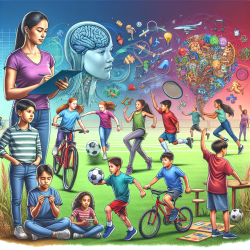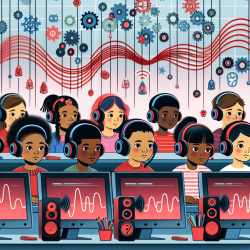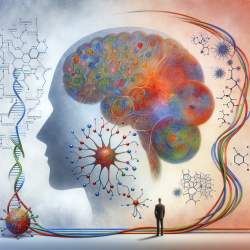Introduction
The COVID-19 pandemic has left a significant mark on global health, and its long-term effects are still being studied. One such area of concern is the neurological post-acute sequelae of SARS-CoV-2 infection (neuro-PASC). The study titled "Longitudinal evaluation of neurologic post-acute sequelae SARS-CoV-2 infection symptoms" provides valuable insights into the evolution of these symptoms. As practitioners in the field of speech-language pathology, understanding these outcomes is crucial for enhancing therapeutic interventions, especially for children who may be affected by these sequelae.
Key Findings of the Study
The study followed 56 participants, primarily female with a mean age of 50 years, over a six-month period. The participants reported a range of neurological symptoms post-COVID-19 infection, with fatigue and headaches being the most common initially. By the six-month follow-up, memory impairment and decreased concentration became more prevalent. Notably, a syndrome consisting of tremor, ataxia, and cognitive dysfunction (PASC-TAC) was observed in 7.1% of patients.
Interestingly, while 33.3% of participants experienced complete symptom resolution by the six-month mark, the majority continued to show improvement, albeit with some persistent symptoms. This suggests a gradual recovery trajectory for neuro-PASC symptoms, which is a critical consideration for therapy planning.
Implications for Speech-Language Pathology
For practitioners working with children, these findings underscore the importance of early identification and intervention for neuro-PASC symptoms. Here are some strategies to consider:
- Early Screening: Implement routine screenings for cognitive and neurological symptoms in children who have had COVID-19. Early detection can lead to timely interventions that may mitigate long-term impacts.
- Individualized Therapy Plans: Given the variability in symptom presentation and recovery, personalized therapy plans that address specific cognitive and neurological deficits are essential.
- Multidisciplinary Approach: Collaborate with neurologists, psychologists, and other healthcare professionals to provide comprehensive care. This holistic approach can enhance therapeutic outcomes for children.
- Family Education: Educate families about the potential long-term effects of COVID-19 and involve them in the therapy process. Family support is crucial for successful intervention.
Encouraging Further Research
While this study provides valuable insights, there is a need for continued research to fully understand the long-term neurological impacts of COVID-19, particularly in pediatric populations. Practitioners are encouraged to contribute to ongoing research efforts by documenting and sharing clinical observations and outcomes.
Conclusion
The findings from the study on neuro-PASC provide a foundation for improving therapeutic strategies in speech-language pathology. By integrating data-driven approaches and fostering collaborative care, practitioners can enhance outcomes for children affected by COVID-19. To read the original research paper, please follow this link: Longitudinal evaluation of neurologic post-acute sequelae SARS-CoV-2 infection symptoms.










